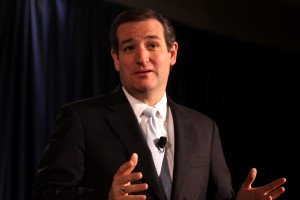
On April 15th, Joe Kernen tee’d up his latest CNBC “Squawk Box” guest, Sen. Ted Cruz, perfectly. Kernen:
Growth, around the world, economic growth almost cures all ills. It cures the sentiment we have right now, the feeling people aren’t getting ahead. Helps you pay down deficits. Helps everything. But we’re in a weird world right now. … I wonder if you know how to explain the cause and the cure.
To which Cruz replied to perfection:
Growth is foundational. My number one priority is growth. Growth. Every other problem we’ve got, whether it’s unemployment, the debt and the deficit, whether it is strengthening and securing social security and medicare, whether it is rebuilding our military and keeping us safe, you’ve got to have growth to make it work. And we have been trapped in stagnation for the last seven years. If we don’t turn that around nothing else gets fixed. …
There is a clear cause and effect. If you look back through history every time we have out of control spending, taxes and regulation we get what we’ve got now. We get this stagnation. … Tax reform and reg reform are the two most potent levers. …
Joe, upping his game, on Reagan’s restoring rapid economic growth in contrast to the limping economy of his predecessor:
… It was like someone flipped a switch. …
To which Cruz replied:
You mentioned monetary policy. Monetary policy as well matters enormously. … We’ve been on this roller coaster with the dollar, it’s up, it’s down, commodities go sky high, they go down, they go sky high. … On money we need monetary stability. We need to end the roller coaster and have stable money. …
I think monetary policy should not be targeting a strong dollar or a weak dollar. I think it should be a stable dollar. … The problem is, the history of the Fed has not been very good in terms of being smarter than the market. … I think we’re far better having a rules-based monetary policy, ideally with some tie to gold, so that you just have a stable dollar. So you know when you’re investing a dollar today you know the dollar is going to keep a consistent worth rather than fluctuate wildly.
Cruz’s statement, predictably, brought the gold-phobic left out of the woodwork. At The New York Times, Matt Flegenheimer did a revue, “Ted Cruz’s Conservatism: The Pendulum Swings Consistently Right,” noting early on: “He wants to return to the gold standard, abolish the Internal Revenue Service and create a tax structure simple enough for Americans to file on postcards.” (The NY Times, for this article, also interviewed APP’s founder, Prof. Robert George, who taught and mentored Cruz when Cruz was at Princeton.)
And The Huffington Post, as if on cue, presented “Ted Cruz Just Reminded The Republican Establishment Why They Hate Him: The Texan senator’s gold standard policy is a terrible idea with a long history,” recycling the long discredited myth that the gold standard — which, in its classical, well functioning form, had ceased to exist over a decade before — somehow was responsible for The Great Depression.
This is a myth which I (among others) laid to rest long ago in my Forbes.com column (among many other publications, too many to cite here). The Huffington Post business journalist, Ben Walsh, clearly did very little research before presenting a series of shopworn, fully discredited, claims that the gold standard is anything other than a counsel of equitable prosperity. Gold certainly is not, as Walsh misconstrues it, a counsel of austerity.
Cruz also excelled promoting his flat tax plan, quite an appropriate subject for an April 15th show:
My tax plan is simple. It is a simple flat tax. For a typical family of four on the first $36,000 you earn you pay nothing. Zero income tax, zero payroll tax, nothing. Above $36,000 … you pay a simple flat tax of 10%. No longer is a hedge fund billionaire paying a lower effective tax rate than his secretary. Everyone pays the exact same…. Everything’s 10% which means people actually allocate capital based on where it’s efficient rather than what the tax laws say because the tax laws are neutral to everything. …
Every income group sees a double digit increase in after tax income. Average family gets $7.600 more in after tax income.
Cruz pointed out that his 10 percent rate (with a $36,000 exemption for a family of four) flat tax and 16 percent rate business transfer tax was, unlike that of his rivals, almost (or fully) deficit neutral, as well as, according to the Tax Foundation, creating the best growth and the best after-tax income outcomes for working people as well as investors of any of the candidates.
Cruz credibly promised robust, across-the-board, economic growth and equitable prosperity. He showed full mastery of the specifics of his own economic policy proposals — and of their likely impact in restoring economic security and equitable prosperity to the lives of workers.
Every poll I have seen shows jobs and the economy to be the number 1 and 2 issues on the minds of voters. By stating, boldly, that “My number one priority is growth,” Ted Cruz spoke right into the yearning of the voters. He clearly is master of his economic policies. What next?
Let’s hope that Ted Cruz, along with all the candidates, from Donald Trump and John Kasich to Hillary Clinton and Bernie Sanders — puts economic growth at the center of the rest of the presidential campaign. Each and every poll says that this is what the voters wish to hear about.
So bring it on, over and over.
Ralph Benko, internationally published weekly columnist, co-author of The 21st Century Gold Standard, lead co-editor of the Gerald Malsbary translation from Latin to English of Copernicus’s Essay on Money, is American Principles Project’s Senior Advisor, Economics.


